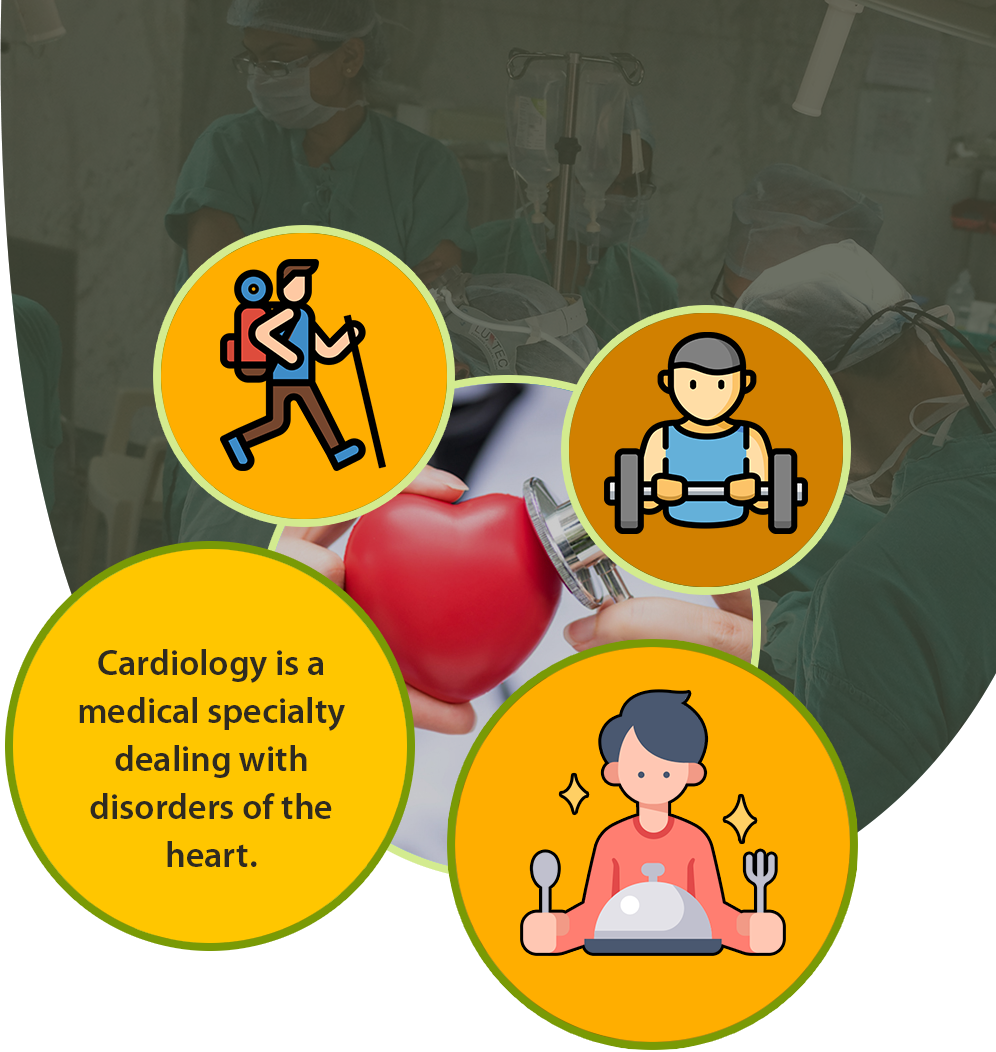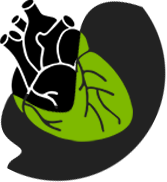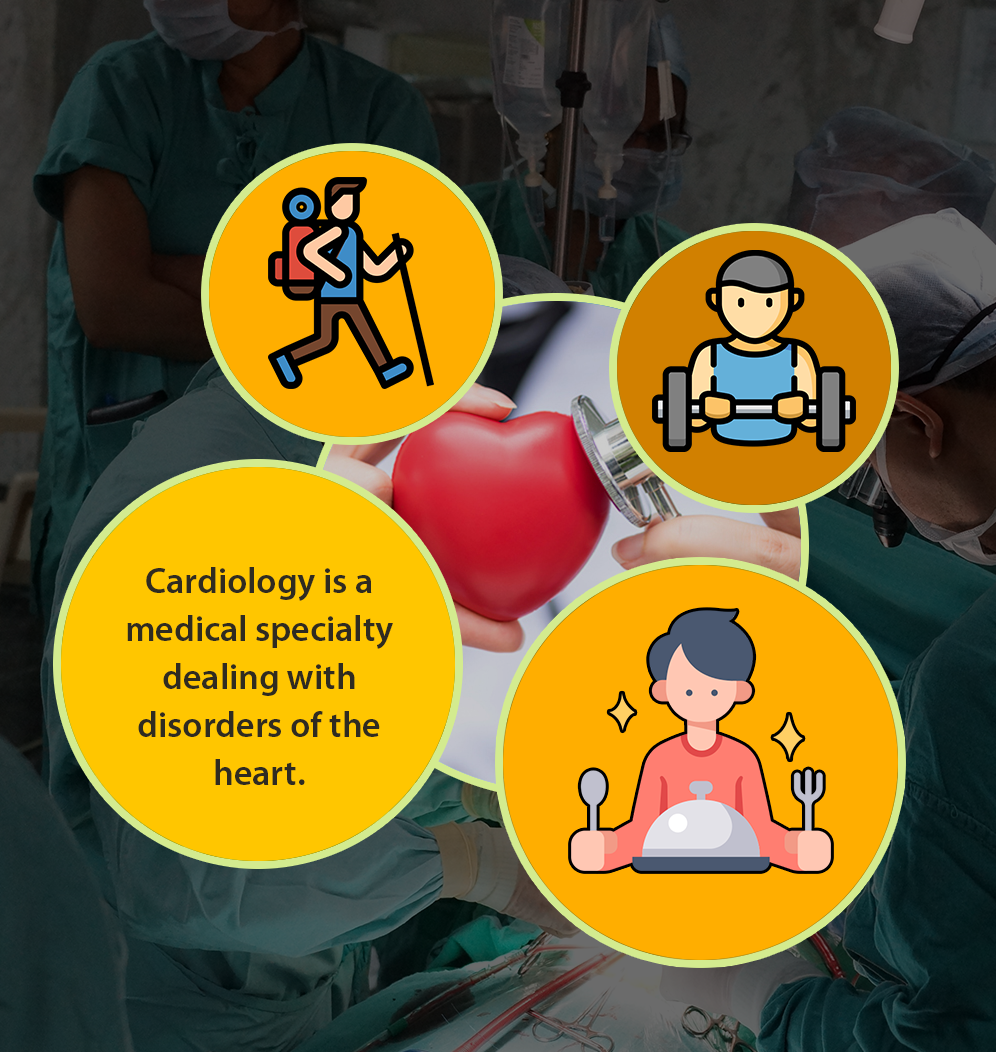

Dr. Swapan Kumar De
Senior Most Interventional Cardiologist at
Apollo Multispeciality Hospital Kolkata.
MD, DM (Cardiology)
Cardiology Doctor in Kolkata, India




The term ''cardiology'' is derived from the Greek word ''Kardiologia'' (transliterated as ''kardia'' and meaning ''heart'' or ''inner self'').
Cardiology is a medical specialty dealing with disorders of the heart. The field includes diagnosis and treatment of congenital heart defects, coronary artery disease, heart failure, valvular heart disease and electrophysiology.
Physicians specializing in this field of medicine are called cardiologists.
Cardiologists should not be confused with cardiac surgeons, cardiothoracic and cardiovascular, who are surgeons who perform cardiac surgery via sternotomy - open operative procedures on the heart and great vessels.
Cardiology (or cardiovascular medicine) is the internal medicine subspecialty that deals with problems of the cardiovascular system: the heart, arteries, and veins. The origins of the word cardiology come from the Greek word kardia, meaning heart or inner self. Cardiologists must graduate from an approved medical school; complete a three-year residency program, and two to three years of additional training.
Cardiologists treat people with diseases or conditions of the heart and people who want to learn the risk factors for heart disease. A primary care doctor or family practice doctor can work with a cardiology specialist to diagnose, treat, and manage heart conditions and help people make heart-healthy lifestyle choices. Patients who are at risk for heart disease or have a history of heart symptoms may see a clinical cardiologist regularly. People with ongoing heart conditions, pacemakers, or frequent heart trouble are likely to see a cardiologist with a subspecialty.
Interventional Cardiology - This subspecialty focuses on interventional procedures such as removing plaque from arteries using cutting and laser devices, catheterization, stent insertion, balloon angioplasty, and Rotoblator.
Electrophysiology - Electrophysiology is the study of the heart's electrical systems. One of the focuses of electrophysiology is the treatment of arrhythmias. These doctors implant and monitor pacemakers and defibrillators.
Nuclear Cardiology - Cardiologists who specialize in nuclear medicine diagnose and treat blockages in the coronary arteries.
Echocardiology - These doctors evaluate echocardiogram and transesophageal echo technology used in patients.
Other subspecialties of cardiology include cardiovascular anatomy, cardiovascular metabolism, cardiovascular pathology, cardiac catheterization, molecular biology of the cardiovascular system, and cardiovascular phyiology.
Cardiothoracic surgery is a separate specialty of medicine from cardiology. Cardiologists complete an internal medicine residency. Cardiothoracic surgeons are required to complete a surgical residency.
Choosing a cardiologist depends on the specific needs of each patient. Recommendation by a family physician or other medical professional and proper insurance coverage will help narrow the list. It is important that a patient find a cardiologist that he/she is comfortable with in order to have a good doctor-patient relationship.
Hypertension - Hypertension is a silent killer.Not only elderly is affected by this disease nowdays it affects young population also .Target BP should be 140/90.But if a person has comorbid like Diabetes,Chronic kidney Disease,Heart Faliure target BP will be 130/80 mm Hg.Young patient will have lower or Diastolic pressure is high so during measurement of BP this thing should keep in mind. High BP rarely cause s symptoms but it damages vital organs.
Atrial Fibrillation - Atrial Fibrillation is one of the important cause of Stroke/Disability and death.Incidence of Atrial Fibrillation occurs as age advances.Commonest cause is long standing Hypertension,Ischemic Heart Disease,Throtoxicosis and Idiopathic.Apart from treatment of A.Fib. lifelong anticoagulants is necessary to prevent Stroke.
About Cardiologists : Cardiologists treat people with diseases or conditions of the heart and people who want to learn the risk factors for heart disease. A primary care doctor or family practice doctor can work with a cardiology specialist to diagnose, treat, and manage heart conditions and help people make heart-healthy lifestyle choices. Patients who are at risk for heart disease or have a history of heart symptoms may see a clinical cardiologist regularly. People with ongoing heart conditions, pacemakers, or frequent heart trouble are likely to see a cardiologist with a subspecialty.